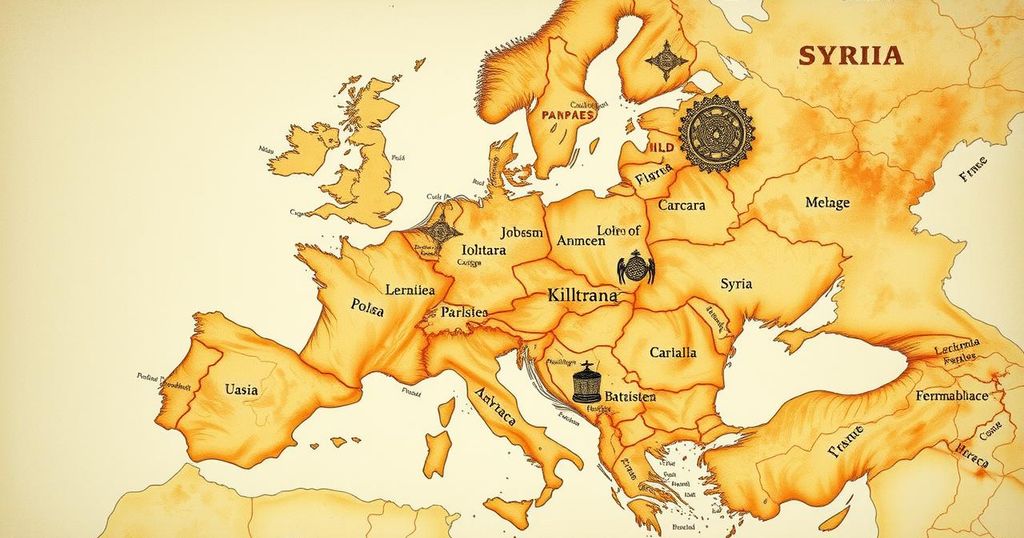Global news
” MACRON, AHMED AL - SHARAA, ASIA, AT TA, DAMASCUS, DIPLOMACY, EMMANUEL MACRON, EUROPE, EUROPEAN UNION, FRANCE, FRANCE24, HAY, INTERNATIONAL RELATIONS, ISRAEL, LEBANON, MACRON, MIDDLE EAST, NATIONAL ASSEMBLY, NORTH AMERICA, REGIONAL SECURITY, SHARAA, SYRIA, TAHRIR AL - SHAM, UK, UNITED STATES, US
Jamal Walker
0 Comments
Syria’s President Al-Sharaa Embarks on Landmark Visit to France
Syria’s President Ahmed al-Sharaa begins his first European visit in France, aiming to showcase a more inclusive government while navigating ongoing challenges amid skepticism surrounding extremist elements. His meeting with President Macron on Wednesday is significant for Syria’s international legitimacy and the quest for sanctions relief and investment.
This week, Syria’s President Ahmed al-Sharaa is set to embark on his inaugural visit to Europe, specifically France, following a surprise announcement made on Tuesday. Since his January appointment as the leader of Syria’s transitional government, Sharaa has formed a new cabinet of roughly two dozen ministers. Notably, he is a former leader of Hay’at Tahrir al-Sham, a rebel group historically linked to al-Qaeda, raising concerns about potential extremism within his administration that might endanger minority groups. Sharaa is keen to present Syria as a country moving towards inclusivity.
This trip, particularly his meeting with French President Emmanuel Macron, marks a significant milestone, being Sharaa’s first official visit to a Western nation. Several European leaders have extended their support to Syria’s new government, particularly in light of the nation’s desire to lift sanctions and attract foreign investment, albeit acknowledging that such processes will take time.
France emerges as a logical initial destination for Sharaa’s western visit owing to its historical colonial ties to Syria and Lebanon, maintaining vested interests in both. Unlike the more cautious stances adopted by the United States and the United Kingdom, France is perceived as potentially offering a more balanced approach to its Middle Eastern policy, which might be advantageous for Syria.
On Wednesday, President Macron is scheduled to welcome Sharaa, according to an announcement from the French presidency reported by AFP. France24 highlighted that Macron intends to reinforce France’s commitment to fostering a new Syria, one that is free, stable, and respects all facets of its society. Additionally, Macron plans to discuss stabilization efforts in the region, including Lebanon, alongside key issues like the fight against terrorism.
The invitation for Sharaa’s visit traces back to February, suggesting a quiet buildup to this meeting behind closed doors. However, Syria is currently beset by numerous internal challenges, including skirmishes with the Druze and recurrent airstrikes from Israel. Moreover, negotiations with the US-backed Syrian Democratic Forces continue as Damascus seeks to navigate these complex issues.
Sharaa’s diplomatic outreach extends towards Turkey and Gulf nations, reflecting attempts to balance various regional interests. France’s relationship with Turkey is often strained, with Paris being more aligned with Armenia and critical of Turkey’s assertive regional behavior, as well as supportive of Kurdish rights.
The upcoming visit will undoubtedly be scrutinized closely. Notably, a recent video surfaced showing Sharaa engaging in a basketball game, a move many perceive as a humanizing effort to connect with the public. However, Syria faces significant hurdles, particularly in infrastructure development, as foreign investments are urgently needed.
Moreover, the presence of extremist elements poses ongoing threats to the stability of the new Syrian government. Controversial appointments, such as that of militia commander Hatem Abu Shakra—alleged to have been involved in the assassination of prominent Kurdish activist Hevrin Khalaf in 2019—are severely undermining Sharaa’s efforts. Such hires could challenge his ability to unify the nation effectively, presenting an uphill battle ahead.
In conclusion, President Ahmed al-Sharaa’s visit to France represents a crucial step for Syria’s new leadership as it seeks to legitimize itself on the international stage. His meeting with Emmanuel Macron, framed against a backdrop of both historic ties and contemporary challenges, underscores France’s potential role as a mediator in the region. Yet, Sharaa must navigate a complex web of domestic and international pressures, particularly regarding extremist elements within his new government, to truly position Syria toward a stable future.
Original Source: www.jpost.com




Post Comment